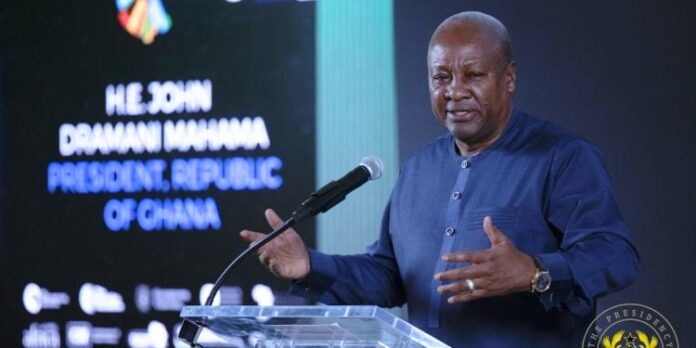Ghana’s President, John Dramani Mahama, together with a coalition of global leaders, has unveiled the Accra Reset—an ambitious initiative aimed at transforming global development financing and partnerships. The launch took place during a high-level side event at the 80th Session of the United Nations General Assembly in New York.
Mahama, who also serves as the African Union Champion for African Financial Institutions, described the initiative as a bold response to what he called a “fraying” global development architecture. He highlighted setbacks from the COVID-19 pandemic, which erased two decades of progress in less than two years, as well as rising debt burdens and climate shocks now placing over 700 million people at risk of hunger.
“The world is only five years from 2030,” Mahama said. “The question is not simply what new targets should replace the SDGs, but how we design institutions and financing systems that actually work. Workability is the name of the game now—innovative financing instruments, new business models, and smarter coalitions that multiply resources rather than ration them.”
Referencing the 2001 Monterrey Consensus that led to global health financing platforms such as GAVI and the Global Fund, Mahama called for a similarly bold rethinking of multilateralism—one that prioritizes sustainable value creation over mere aspirations.
The Accra Reset proposes a new global development framework anchored on three key principles: sovereignty, workability, and shared value. The health sector will serve as the starting point and proof of concept, shifting from aid dependency to health sovereignty. This builds on commitments made at the Africa Health Sovereignty Summit held in Accra in August 2025.
To implement the Reset, a coalition known as the Club of Accra will pilot financing innovations and establish “geostrategic dealrooms” to channel investments into health, climate, food security, and job creation.
A major announcement was the creation of a Global Presidential Council, bringing together leaders from Africa, Asia, Latin America, and other regions to ensure political leadership and accountability. Additionally, a Global College of Advisors will be formed, comprising leading experts in health, finance, innovation, and business, to guide pilot projects and design new financing mechanisms.
The initiative has already garnered wide-ranging support. Former Nigerian President Olusegun Obasanjo, co-convener of the initiative, urged a new era of solidarity and a move away from aid dependency. Former UK Prime Minister Gordon Brown described the Accra Reset as “a plan for the future,” stressing the importance of strengthening health sovereignty.
A speech delivered on behalf of Kenyan President William Ruto emphasized aligning financing with national ambitions and holding the Global Presidential Council accountable for delivering universal health coverage. Barbados’ Prime Minister Mia Mottley pledged to align industrial and skills policies to boost pharmaceutical manufacturing across the Global South.
Private sector support was also strong, with Aigboje Aig-Imoukhuede, Chairman of Access Bank, committing to mobilize financing and leadership. Endorsements also came from WHO Director-General Dr. Tedros Adhanom Ghebreyesus and WTO Director-General Dr. Ngozi Okonjo-Iweala, both stressing the urgency of “rewiring” outdated global norms.
With the 2030 deadline for the Sustainable Development Goals approaching and fewer than half of the 169 targets on track, the Accra Reset is being presented as a blueprint to realign the global development agenda with today’s pressing realities.
Source: AdomOnline



